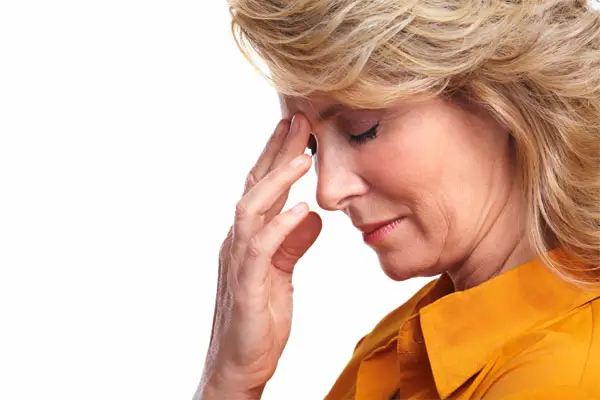
Menopause can be a dirty word to some women, but it is something women have been dealing with since the beginning of time, and it doesn’t have to be a scary or painful experience.
While there are many negative stereotypes surrounding it, what does menopause mean for a woman? Menopause is the time in a woman’s life where her period stops and estrogen production and levels significantly decrease.
The symptoms of menopause often predate the diagnosis; doctors will typically diagnose menopause when a woman’s menstrual cycles have stopped for a full year.
The Science of Menopause
Without getting too technical, starting in your late 30s your body will begin to produce less estrogen and progesterone.
Thankfully, rather than dropping all at once, these hormone levels begin to gradually decrease over time, so that by your late 40s or early 50s, you are approaching the point when your hormone levels will no longer stimulate menstruation.
However, this can mean many years of seemingly inexplicable changes occurring within your body, as it begins to adjust to its new routine.
Menopause does not always occur naturally. A full hysterectomy – that removes both the uterus and your ovaries – will induce menopause.
Because this change occurs rapidly as opposed to the natural biological reduction of hormone levels over time, symptoms can be extremely severe, but as you will be working with a medical professional, he or she will be able to recommend the right course of action.
Similarly, chemotherapy and certain cancer treatments have been linked to early onset of menopause, but your body will typically return to normal, and again, your doctor will be able to help you along the way.
Perimenopause
Perimenopause is the common name for the period of time when menopause symptoms begin but before you have had a full year with no menstrual cycle.
This can be the most uncomfortable time of menopause for some women, because it is not always immediately clear what these new symptoms are related to and they are common to many other illnesses.
Rather than cause undue and harmful anxiety, if you are experiencing any of these symptoms and are a woman within the age range of 45 and 55 years old, you may be in the early stages of menopause and it is time to talk to a medical professional.
Perimenopause and Menopause: The Physical Symptoms
There is no clear dividing line between which symptoms are most common in perimenopause and which are most common in menopause, but some of the most uncomfortable and stereotypical experiences of menopause often start before your full diagnosis.
Irregular periods
While irregular periods can be symptoms of other illnesses, if you are in the age range of menopause and start experiencing patterns of spotting and/or missed periods, this is your best clue that menopause is starting.
Some women also experience heavier flows during this time, so the key is keeping an eye on anything that varies from your typical menstrual cycle.
Hot flashes
Possibly one of the most feared symptoms of menopause, hot flashes affect women predominantly during the day, and are characterized by a hot, flushed feeling, sometimes accompanied by excessive sweat.
Since hot flashes come on at unexpected times, they can be a huge cause of anxiety related to menopause.
As excessive sweating can be a symptom of something else and flushed feelings can indicate fever, it is always best to speak to a medical professional if you feel you’ve experienced a hot flash.
Night sweats
Night sweats, similar to hot flashes, are a symptom of menopause in which the body is reacting to changes in temperature that may not be present.
Night sweats are literally defined by the fact they cause excessive sweating, which can be incredibly uncomfortable and embarrassing for sufferers.
New theories believe that night sweats and hot flashes are due to the effect of dropping levels of estrogen on the hypothalamus, the part of the brain that regulates body temperature.
Essentially, the brain gets tricked into thinking you are hotter than you really are, thus causing the body to produce sweat.
Vaginal dryness
An incredibly uncomfortable symptom of menopause, vaginal dryness can contribute to infections as well as difficulty during sexual intercourse.
This also occurs in other illnesses, but in concert with any of the above, can indicate the beginnings of menopause.
Many women are embarrassed by vaginal dryness symptoms, but a medical professional is more than experienced with similar issues, and will greatly help you reduce your suffering.
Weight gain
As if that all wasn’t enough, your metabolism begins to slow during and after menopause, which can contribute to weight gain – even in those who have never had weight problems.
If you are noticing that your diet and exercise routine haven’t changed but you are gaining weight, check with a doctor to consider options from pregnancy to menopause.
Perimenopause and Menopause: The Emotional Symptoms
While many of menopause’s symptoms are physical, you may also be experiencing significant changes in mood and emotional stability.
Women experiencing perimenopause and menopause often relate horror stories of feeling like different people, and family members and loved ones can often be caught in the crossfire.
Rapid changes in mood are unfortunately common, and a sign that hormonal changes are occurring with your body.
Many of menopause’s symptoms can also fuel anxiety, which will only exacerbate your physical issues. While much of this is caused by the changes in estrogen production levels within your body, the experience of going through menopause can be an emotionally challenged one.
Since it means the end of childbearing abilities, many women begin to suffer with concerns over age and self-confidence, and this, along with menopause’s hormonal changes, can cause significant distress.

Treatment options for menopause
As menopause by definition affects a large part of the world’s population, there are a number of effective treatments that have been developed to ease symptomatic suffering, but there is no one cure-all medical treatment.
Depending on your needs and values, simple lifestyle changes or hormonal therapy can be viable options to help women cope with menopause.
Natural Remedies
Some of this has already been covered in detail, but there are a number of different lifestyle changes that you can implement to help with the pain of menopause.
Ingesting tons of fluids is key, as your body’s wellness is dependent on a constant supply of water.
A healthy diet of fruits and vegetables will also help to keep you hydrated, and will help support a number of your body’s systems to optimize your health.
A good night’s sleep is necessary to ensure your body can recover from the changes it is experiencing.
While some of the symptoms of menopause may affect sleep quality, make sure that you are able to get at least six to eight hours each night.
For trouble sleeping, try reducing agitation before bed (skip the late-night action flick) and be mindful of what you eat. Spicy foods can dehydrate you and contribute to your body not getting enough rest.
If night sweats are a problem, try looser clothing or lower-thread count sheets; both can allow more air to flow and help to keep your body at a stable temperature.
For hot flashes, carry a fan around with you, and keep tissues or a handkerchief nearby. If you are experiencing excessive sweating during your hot flashes, carry an extra shirt around just in case.
Alcohol and smoking can both dehydrate you and wreak havoc on your body, so it’s best to avoid these as much as possible during menopause.
Similarly, get thee to a gym and start exercising; this will help with your overall health and keep your body working at peak performance. Plus, losing weight is always a great way to ease the strain on an overworked body.
Taking steps to positive mental health is a huge component of surviving the struggles of menopause.
Seeing a therapist to talk through some of the emotional responses to the loss of fertility or the process of aging can reduce your stress and anxiety greatly.
Doing regular exercise and incorporating mediation into your daily routine can also help improve your overall wellness.
If talking to a mental health professional is out of the question, try communicating with family members and friends both as a way to help reduce some of your anxiety and as a way to help increase their understanding of what you are going through.
You will be shocked at the amount of anxiety that can be reduced by maintaining positive dialogue with those closest to you.
Keeping a journal can be incredibly helpful when navigating menopause, as it can allow you to track symptoms and any triggers that may have caused onset.
Logging food can help you figure out what contributes to your night sweats, and you’ll have a better idea of your overall routine, and where you can make changes that will help.
This can help you meet exercise and diet goals, and becomes a valuable resource for when you are meeting with your doctor.
Medical Remedies
While there is no “cure-all” for menopause, there are many options that a medical provider can help you consider.
It is essential that during the age range of menopause you have a trusted medical provider to help provide you with options as well as screen for related complications.
Hormone therapy is probably the most popular medical treatment for the symptoms of menopause. As your body’s levels of estrogen production drop, your doctor can supplement with estrogen and progestin to relieve some symptoms.
Understandably, this can help alleviate some of your body’s adjustments to declining levels, as it tricks it into thinking they are higher.
However, as most of these treatments derive hormones from animals like sheep or horses, if you have any religious or moral opposition you may need to seek alternative treatment.
Vaginal estrogen is applied topically to the vaginal area (sometimes as a cream or in a ring form), and has proven helpful in relieving symptoms like vaginal dryness.
Vaginal estrogen is given in a much smaller dose than hormone therapy, and is therefore not a replacement for more comprehensive hormonal treatments, but can be helpful for women who may not need full hormone therapy treatments.
Selective serotonin reuptake inhibitors (SSRIs) are a class of anti-depressants that have proven useful as an effective drug treatment for the symptoms of menopause.
These drugs have shown themselves to be useful in reducing or eliminating hot flashes, and are particularly helpful for women experiencing mood changes or depression-like symptoms.
As they can be helpful for anxiety as well, they are a great option for women who are suffering from the emotional symptoms of menopause.
Gabapentin (Neurontin) is typically used at high doses for seizure disorders, but at low doses can be useful in reducing migraines and can lessen the symptoms of bipolar disorder.
Gabapentin has shown positive effects on lessening occurrences of hot flashes and night sweats, and can be taken before bed as a sleep aid.
Alternative Remedies
For those preferring the super-natural path, there are many options outside of lifestyle changes and medical treatments that can help with menopause.
Some women tout phytoestrogens (yes, plant estrogens) that occur in many beans, fruit, and grain as a way to help with hot flashes and night sweats, although they haven’t been proven effective in a scientific capacity.
Similarly, black cohosh is a plant that is currently being studied for its medicinal properties, specifically related to menopause.
Acupuncture is a favorite treatment for some women as a way to reduce hot flashes and as a way to help relieve stress and anxiety.
While many people fear that acupuncture needles will “hurt,” a trained and experienced acupuncturist will have you setup without you even knowing he or she started.
Bio-identical treatments are on the rise, although they are generally not FDA approved and the science is still out on their effectiveness.
Basically, bio-identical treatment is the plant-derived version of hormone therapy, in that rather than supplementing estrogen with an animal-derived hormone, these treatments use plant-derived hormones.
This has become an option for women who may decline hormone therapy due to religious or moral beliefs.
Postmenopause
So you made it through menopause. Your menstrual cycle has stopped and your symptoms have finally abated. All clear?
Not quite.
Unfortunately, due to the changes your body has experienced, there are a number of conditions that can affect you after menopause has run its course.
Due to the reduction of estrogen your body produces, you are now at greater risk for heart disease. Ensure regular checkups and a healthy diet to address any heart concerns before they escalate.
Osteoporosis affects many women after menopause, and is when your bones become less dense and therefore more prone to breakage.
Taking calcium regularly or specific supplements will greatly reduce your chances of osteoporosis, as will eating a healthy diet and getting regular exercise.
Sometimes postmenopausal women experience involuntary urination, occasionally when sneezing, laughing, or coughing. There are pelvic exercises – or kegels – that you can do to help reduce the chance of incontinence.

How to cope: What does menopause really mean to a woman?
Dina was in her mid-40s when she began experiencing the symptoms of perimenopause, but with three young daughters she was sure that she was still too young for it.
Chalking her symptoms up to being a busy working mother of three, it wasn’t until her annual OB/GYN exam that she was brought to the reality that she was likely entering menopause.
Dina immediately fell apart, and began isolating from her family. Her job performance suffered and her relationships began to fall apart, as she entered a cycle of emotional turmoil that left her overweight and on the verge of a divorce.
This was when Dina decided not to give in, and regained control of her life without requiring expensive treatments.
She began taking Yoga classes, changed her diet, and started to see a therapist twice a month, which not only helped her feel better, but also improved her family relationships. Rather than trying to see everything she had lost, she instead learned to focus on all the benefits her body’s changes could bring to her.
Needless to say, when her daughters entered puberty and finally got their periods, Dina was more than happy in her postmenopausal state.
Menopause – both the symptoms and the meaning behind it – can be a terrifying experience for a woman, but it’s important to remember that MILLIONS of women are experiencing the exact same thing.
Stories like Dina’s can be found on message boards across the Internet, and even by talking to your older friends and family.
Be proactive if you are in the age range for menopause, and start meeting with medical professionals, eating right, exercising, and building a community of support.
Be sure to communicate with loved ones about the changes that you are or will be experiencing, as this will help reduce anxiety and tension in the home, which can help ease the symptoms of menopause.
You – like every other woman who has lived or will live – can get through this.
References
http://www.mayoclinic.org/diseases-conditions/menopause/basics/definition/con-20019726
http://www.webmd.com/menopause/guide/menopause-overview-facts
http://www.menopause.org/for-women